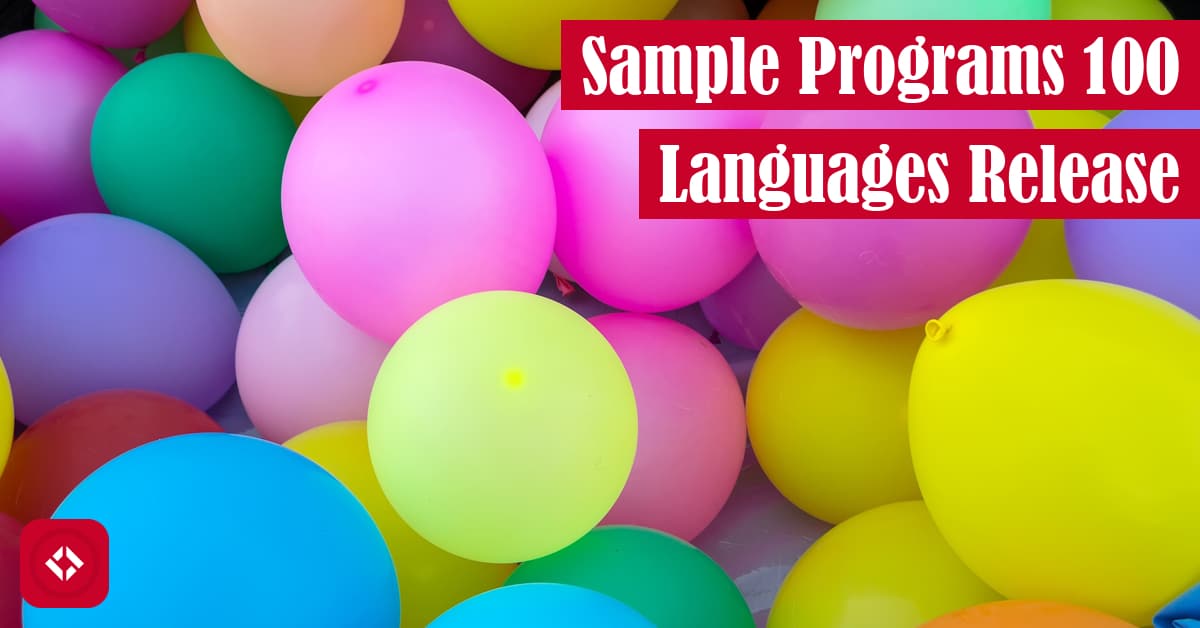Just before thanksgiving, I made my first formal release of the Sample Programs repository because we finally reached 100 languages. Let’s talk about how we got here.
Table of Contents
Launching the Project
I launched the Sample Programs project just 3 days before my wedding as an idea for 100 Days of Code. I thought maybe I could write a Hello World program with a brief article every day for 100 days, but that quickly became exhausting. In addition, I found that there were already several Hello World collections, so I didn’t feel like I was doing anything unique.
That said, I was having a lot of fun exploring languages that I had never even heard of such as Red, Wren, and Scala. However, at some point, the little Hello World in Every Language project began to outgrow itself.
Eventually, I decided to open up my project to other types of programs like fibonacci, factorial, and fizz buzz. At the same time, I abandoned the 100 Days of Code commitment, so I could focus on much more long term goals for the project.
Getting Some Help
Unfortunately, I had one major problem: I needed help to sustain the project. As a possible solution, I tried to leverage social media, but that ended up being a waste of time.
That was until I stumbled upon Ben Halpern’s twitter profile. See, I had been following a lot of tech folks with the hope that they may be interested in helping out with the project, but nothing was going my way. At some point, I ended up following Ben who founded dev.to , a tech community website.
, a tech community website.
Over time, I noticed that Ben would do weekly posts where developers could share their open-source projects, so I figured why the hell not? After dropping my project in the comments, I started to get a steady flow of contributors.
Thanks to Ben, I probably have 5 or so regular contributors which is insane to me. Overall, I’ve had 58 contributors as well as 99 stars and 78 forks since launching the project. I’d say that’s a very successful project for starting from nothing.
Of course, I don’t think the project really got the exposure it needed until October when I started to leverage Hacktoberfest, an annual pull request event. Just by tagging a few issues, I was able to get a wealth of contributors over the span of that month. In fact, the influx of contributions forced me to rework the project several times.
As a reaction, we began enforcing a program requirements file before we allow new program contributions. In addition, we launched a GitHub Pages site which hosts all of our documentation in the same repo. All-in-all, October had been very good to us.
which hosts all of our documentation in the same repo. All-in-all, October had been very good to us.
Hitting 100 Languages
Well, I can’t exactly write an article declaring the 100 languages accomplishment without writing about it, so let’s take a look!
As of November 22nd, 2018, we’ve officially collected enough code snippets to cover 100 programming languages. Here’s the official list:
- Agda
- Abap
- ALGOL68
- Ada
- AppleScript
- Bash
- Befunge
- Brainfuck
- Ballerina
- C++
- Crystal
- COBOL
- C*
- C#
- C
- Carp
- Chapel
- Clipper
- Dart
- Dale
- D
- Dg
- Elixir
- Emojicode
- Egison
- Elm
- Elena
- Eve
- Erlang
- Fetlang
- Ferret
- Felix
- Forth
- FORTRAN
- F#
- Factor
- Frege
- Gravity
- Goby
- Google Apps Script
- Go
- Groovy
- Golo
- Haskell
- Hack
- Idris
- JavaScript
- Java
- Julia
- Koka
- Kotlin
- Kitten
- Lily
- Lolcode
- Lua
- Lisp
- Little
- MoonScript
- MojiScript
- MATLAB
- Nim
- Never
- Owl Lisp
- Orc
- Opa
- Objective C
- OCAML
- Octave
- Odin
- PHP
- Python
- PowerShell
- Pascal
- Pony
- PicoLisp
- Perl
- Pyret
- Quack
- Rust
- Ring
- Rexx
- Red
- Ruby
- R
- Racket
- Solidity
- Swift
- Shen
- Scala
- Scheme
- Smalltalk
- Tcl
- Tex
- TypeScript
- Vimscript
- Verilog
- Visual Basic
- Wren
- Wu
- Wyvern
If you’re interested in more information like the number of snippets or number of articles per language, check out the official release on GitHub .
.
Looking Ahead
Naturally, I can’t help but look ahead as I continue to watch the project grow. At 100 languages, we’ve just barely scratched the surface, so why would we stop now?
Coming up, I expect to publish a release for 250 code snippets by the end of the year. If I’m lucky, I might hit 100 articles as well, but we’ll see. In either case, expect another article like this one.
Recent Posts
It's July 2024, and I have three chapters of my dissertation drafted! Two more and we'll be ready to defend.
In growing the Python concept map, I thought I'd take today to cover the concept of special methods as their called in the documentation. However, you may have heard them called magic methods or even...

